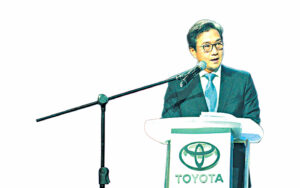AND SO IT GOES: The Philippine auto industry is giddy over the sales results in 2024. Car makers in the country are taking turns hosting thanksgiving events to express appreciation for the gains made. There is much to celebrate, really.
The Chamber of Automotive Manufacturers of the Philippines, Inc. (CAMPI) and Truck Manufacturers Association (TMA) reported sales of 467,252 units, just shy of their projection of 468,000. This represents growth of about 9% versus the 429,807 units sold in 2023 and is the highest-ever mark for both associations.
On the other hand, Toyota Motor Philippines (TMP) leadership reported that the Philippine auto market may have, in fact, achieved a new all-time sales record of 474,000 units in 2024. This beats the previous record of 473,000 units in 2017. In its count, TMP includes sales of both CAMPI and TMA, along with the reckoning of the Automotive Vehicle Importers and Distributors (AVID) and some members of the Electric Vehicle Association of the Philippines (EVAP).
There were a lot of big movers in 2024. Among the Japanese makes, Toyota retained its market leadership, with sales growing by 9% to 218,019 units. Mitsubishi grew faster than the industry average, increasing sales by 13.7% to 89,124 units. Compared to sales of 53,211 units in 2022, its growth is even more remarkable at 67.5%. Honda sales grew by 11.4%, Suzuki by 10.4%.
The Korean auto brands also posted significant growth. Hyundai reported sales of 12,023 units (+31.7%), while Kia recorded an uptick of 33% to 6,692 units.
Of course, Chinese brands also grew significantly in 2024. MG — whose distribution in the Philippines was taken over by parent SAIC Motor — reported sales of 9,016 units, up 59% from the previous year’s 5,679 units. GAC Motor Philippines — distributed by Astara Philippines — recorded even larger growth of 65.1% on sales of 3,207 units. The biggest gain belongs to electric vehicle specialist BYD. BYD Cars Philippines and ACMobility (the official distributor of BYD passenger vehicles in the country) sold 4,780 units reportedly, representing a whopping 8,900% uptick from the 2023 figure.
Indeed, the 2024 sales reports augur very well for the auto industry in the Philippines. It has clearly put the country back on track toward motorization, following the disruption by the COVID-19 pandemic. Given the economic growth targets of government, it is likely that the importance of the auto sector to national development will continue to rise. In fact, the pronouncement of the government of its aim to strengthen the manufacturing sector opens a clear opportunity for automotive manufacturers. As the market continues to expand its scale and more automakers take interest in entering the Philippines, it seems timely for the industry to leverage its collective strength in the pursuit of a unified program that can significantly drive economic development for the country. This was the call made by TMP Chairman Alfred V. Ty at a recent media gathering.
“As the Philippine auto market continues to expand, I am very much encouraged by the added possibilities this growth brings with it. The auto industry is truly transforming into a major pillar of economic development,” he said. “The rapid and significant influx of automakers is a very welcome indicator. The one thing that attracts automakers the most to any market is increasing sales volumes,” he continued. Mr. Ty believes that as motorization progresses, new opportunities open for local manufacturing. “I am a strong advocate of ‘gawa ng Filipino para sa Filipino,’ so this is a very welcome prospect for nation-building. More important than the records set, the expanding market reflects a thriving domestic economy, and a nation and a people on the move,” the executive concluded.
In 2024, the growth in Toyota sales allowed TMP to secure over 69,000 jobs for Filipinos, contribute P35 billion to government revenues, and realize over US$1 billion in auto parts exports for the Toyota group. Given that Toyota accounts for over 40% of the market, Mr. Ty estimates that the whole auto industry could have very well contributed almost twice as much to the Philippine economy, making the automotive sector a very significant contributor to economic development. It is estimated that there are about 12 automotive OEs represented in the country, distributing around 60 different brands and more than 400 models on the road.
In a similar recognition of the growing importance of the Philippine auto market, Mitsubishi Motors (Japan) Executive Vice-President Tatsuo Nakamura announced in April 2024 the new sales record for Mitsubishi in the Philippines in fiscal year 2023. At that time, he mentioned that Mitsubishi Motors “will concentrate management resources to growth drivers,” including the Philippines. He noted that the new car market in the country has been growing rapidly along with the growth rate of the population and economy, and is expected to continuously grow further in the midterm.
Toyota and Mitsubishi are the two largest local producers of motor vehicles in the country. Other makers that maintain production operations in the country are Isuzu, Hino, Foton and some Chinese truck manufacturers.
Looking ahead, TMP projects industry sales of 512,000 units in 2025, up by 8% versus 2024. Main drivers will be GDP growth of over 6%, a sound financial sector with a growing consumer loan portfolio, expanding OFW remittances and BPO earnings, sustained government and private infrastructure spending, and incremental economic demand from election-related spending.
Other auto makers have also expressed similar optimism in the growth prospects for the Philippines. These expressions of confidence are heartening and are, hopefully, harbingers of a more concerted effort among automakers and the government toward nation-building. It is time to harness the combined capabilities and resources of the entire auto sector into a major economic force and manufacturing hub in support of the nation’s long-term development plans.
